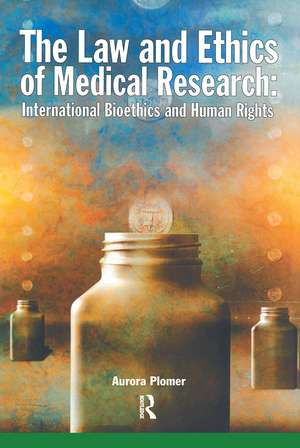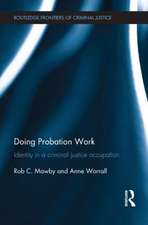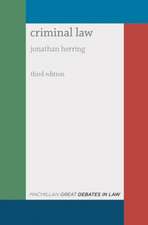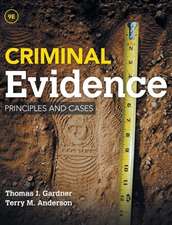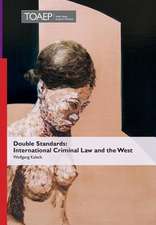The Law and Ethics of Medical Research: International Bioethics and Human Rights
Autor Aurora Plomeren Limba Engleză Paperback – 2 feb 2005
This book examines the controversies surrounding biomedical research in the twenty-first century from a human rights perspective, analyzing the evolution and changes in form and content of international instruments regulating the conduct of biomedical research.
The approach adopted is comparative and includes an evaluation of human rights and UK and US law on embryonic stem cell research, the HIV/AIDS trials in the developing world, the Alder Hey Inquiry and the human radiation and nerve gas experiments on human subjects in the US and the UK. This is the first book to analyze some of the major issues in biomedical research today from an international, comparative human rights perspective.
Preț: 302.01 lei
Nou
Puncte Express: 453
Preț estimativ în valută:
57.80€ • 59.71$ • 48.10£
57.80€ • 59.71$ • 48.10£
Carte tipărită la comandă
Livrare economică 26 martie-09 aprilie
Preluare comenzi: 021 569.72.76
Specificații
ISBN-13: 9781859416877
ISBN-10: 185941687X
Pagini: 176
Dimensiuni: 156 x 234 x 16 mm
Greutate: 0.27 kg
Ediția:1
Editura: Taylor & Francis
Colecția Routledge-Cavendish
Locul publicării:Oxford, United Kingdom
ISBN-10: 185941687X
Pagini: 176
Dimensiuni: 156 x 234 x 16 mm
Greutate: 0.27 kg
Ediția:1
Editura: Taylor & Francis
Colecția Routledge-Cavendish
Locul publicării:Oxford, United Kingdom
Cuprins
From Bioethics to Human Rights in Biomedicine; Human Rights and Non-Therapeutic Research: Domestic Remedies and Convention Rights; Stem Cell Research: Human Dignity and the Right to Life; The Rights of the Dead: Research on Human Tissue and Body Parts after Bristol and Alder Hey; Research in Developing Countries: New Ethics and New Threats to Human Rights.
Recenzii
'Controversy about medical research is rarely out of the news. This book covers the law and ethics touching on a broad range of different kinds of research, from embryo research to research of the dead, and offers a comparative and multinational insight into the regulation of medical and scientific advances. Health professionals, lawyers, ethicists and indeed, research subjects will learn a great deal from this work.' - Professor Margaret Brazier, University of Manchester
'This book by a leading British health care lawyer and philosopher provides the first sustained and in-depth analysis of the impact of the Council of Europe's Convention on Human Rights Biomedicine (CHRB) on research ethics...In all three parts the analysis is wide ranging and incisive, and the author manages to draw on both her legal and philosophical competence. I personally disagree with the author on a number of points, especially whether the human rights framework introduced by the CHRB is really more determinate than the previous principles framework in the Helsinki Declaration, but these are minor quibbles. In summary this is an excellent book that should find its place on the shelves of any European academic seriously interested in biomedical research ethics and law.' - Soren Holm, Journal of Medical Ethics, September 2005
'This meticulous book, with a copious bibliography and references, provides much concrete detail (including a table of relevant cases from 1788 to the present) that will illuminate ongoing discussion of medical ethics.' - Bernard Ada, British Medical Journal, 30 July 2005
'There are very few authors with the philosophical and legal background to write a book such as this, so readers will be pleased to find a work written with deep knowledge, clarity, and sensitivity.' - Roger Crisp, St Anne's College, Oxford
'The book is a rich exploration of a complex set of questions, and it provides an important, fertile context for the asking ethical questions in the globalization of medical research.' - K. W. Wildes, Human Rights Review, vol. 9 no. 1 (2008)
'…this is a worthy and stimulating read which draws profitably from the author’s legal and philosophical experience, and it represents a useful tool for anyone who is interested in human subject research, bioethics and emerging biolaw.' - Shawn H.E. Harmon, Script-ed, vol. 4 no. 2 (2007)
'… there are two reasons why the book should have appeal to anyone interested in this area of law and ethics. First, it provides an articulate and interesting discussion of the main legal and ethical developments in this area and so will be a valuable resource. Secondly, regardless of whether you agree with Plomer's approach or all of her arguments, the book should stimulate thought and debate.' - Alasdair Maclean, Medical Law Review, Vol. 14 no. 2 (2006)
'…a coherent argument for the need to readdress the type of ‘standards’ of behaviour required both by research sponsors and the courts in examining possible abuses. Each chapter draws on illustrative examples of abuse and concludes with an analysis of the failings of ‘principle driven regulation’ and explores a fledgling taxonomy based upon more specific human rights, already neatly set up and laid out in Chapters 1 and 2..' - Stuart Andrews, Modern Law Review, vol. 69 no. 2 (2006)
'The book is a rich exploration of a complex set of questions, and it provides an important, fertile context for the asking ethical questions in the globalization of medical research.' - K. W. Wildes, Human Rights Review, vol. 9 no. 1 (2008)
'...this is a worthy and stimulating read which draws profitably from the author’s legal and philosophical experience, and it represents a useful tool for anyone who is interested in human subject research, bioethics and emerging biolaw.' - Shawn H.E. Harmon, Script-ed, vol. 4 no. 2 (2007)
'...there are two reasons why the book should have appeal to anyone interested in this area of law and ethics. First, it provides an articulate and interesting discussion of the main legal and ethical developments in this area and so will be a valuable resource. Secondly, regardless of whether you agree with Plomer's approach or all of her arguments, the book should stimulate thought and debate.' - Alasdair Maclean, Medical Law Review, Vol. 14 no. 2 (2006)
'This book by a leading British health care lawyer and philosopher provides the first sustained and in-depth analysis of the impact of the Council of Europe's Convention on Human Rights Biomedicine (CHRB) on research ethics...In all three parts the analysis is wide ranging and incisive, and the author manages to draw on both her legal and philosophical competence. I personally disagree with the author on a number of points, especially whether the human rights framework introduced by the CHRB is really more determinate than the previous principles framework in the Helsinki Declaration, but these are minor quibbles. In summary this is an excellent book that should find its place on the shelves of any European academic seriously interested in biomedical research ethics and law.' - Soren Holm, Journal of Medical Ethics, September 2005
'This meticulous book, with a copious bibliography and references, provides much concrete detail (including a table of relevant cases from 1788 to the present) that will illuminate ongoing discussion of medical ethics.' - Bernard Ada, British Medical Journal, 30 July 2005
'There are very few authors with the philosophical and legal background to write a book such as this, so readers will be pleased to find a work written with deep knowledge, clarity, and sensitivity.' - Roger Crisp, St Anne's College, Oxford
'The book is a rich exploration of a complex set of questions, and it provides an important, fertile context for the asking ethical questions in the globalization of medical research.' - K. W. Wildes, Human Rights Review, vol. 9 no. 1 (2008)
'…this is a worthy and stimulating read which draws profitably from the author’s legal and philosophical experience, and it represents a useful tool for anyone who is interested in human subject research, bioethics and emerging biolaw.' - Shawn H.E. Harmon, Script-ed, vol. 4 no. 2 (2007)
'… there are two reasons why the book should have appeal to anyone interested in this area of law and ethics. First, it provides an articulate and interesting discussion of the main legal and ethical developments in this area and so will be a valuable resource. Secondly, regardless of whether you agree with Plomer's approach or all of her arguments, the book should stimulate thought and debate.' - Alasdair Maclean, Medical Law Review, Vol. 14 no. 2 (2006)
'…a coherent argument for the need to readdress the type of ‘standards’ of behaviour required both by research sponsors and the courts in examining possible abuses. Each chapter draws on illustrative examples of abuse and concludes with an analysis of the failings of ‘principle driven regulation’ and explores a fledgling taxonomy based upon more specific human rights, already neatly set up and laid out in Chapters 1 and 2..' - Stuart Andrews, Modern Law Review, vol. 69 no. 2 (2006)
'The book is a rich exploration of a complex set of questions, and it provides an important, fertile context for the asking ethical questions in the globalization of medical research.' - K. W. Wildes, Human Rights Review, vol. 9 no. 1 (2008)
'...this is a worthy and stimulating read which draws profitably from the author’s legal and philosophical experience, and it represents a useful tool for anyone who is interested in human subject research, bioethics and emerging biolaw.' - Shawn H.E. Harmon, Script-ed, vol. 4 no. 2 (2007)
'...there are two reasons why the book should have appeal to anyone interested in this area of law and ethics. First, it provides an articulate and interesting discussion of the main legal and ethical developments in this area and so will be a valuable resource. Secondly, regardless of whether you agree with Plomer's approach or all of her arguments, the book should stimulate thought and debate.' - Alasdair Maclean, Medical Law Review, Vol. 14 no. 2 (2006)
Descriere
This book examines the controversies surrounding biomedical research in the twenty-first century from a human rights perspective, analyzing the changes in form and content of international instruments for regulating the conduct of biomedical research.
